| SHADOWS ON THE WALL | REVIEWS | NEWS | FESTIVAL | AWARDS | Q&A | ABOUT | TALKBACK | |||||
 Shadows off the beaten path Shadows off the beaten pathIndies, foreign, docs and shorts...
On this page:
COW |
FINAL ACCOUNT |
WRITING WITH FIRE
| |||||
| See also: SHADOWS FILM FESTIVAL | Last update 8.Jan.22 | |||||
|
Cow Review by Rich Cline | 
| |||||
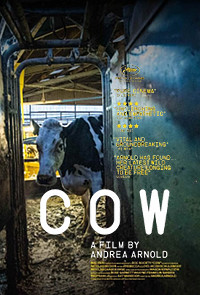 dir Andrea Arnold prd Kat Mansoor release US Sep.21 tff, UK 14.Jan.22 21/UK BBC 1h34 CANNES FILM FEST  Now streaming... |
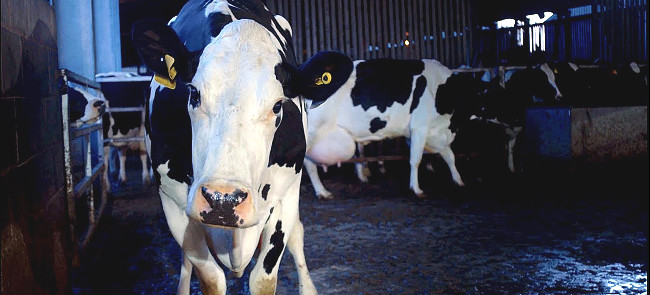 Observing the life of a dairy cow, Andrea Arnold's first documentary is eerily similar to her dramas: clear-eyed and unflinching, with a searing focus on female empowerment. Without dialog or narration, the film builds a remarkable sense of intimacy using close-up camerawork by tenacious cinematographer Magda Kowalczyk. Yes, there's a bit of anthropomorphising going on, and some amusingly witty touches along the way. And it's ultimately very emotional too. The film opens as the cow Luma gives birth to a calf, then is interrupted from her natural maternal instincts by farmers who remove her calf for hand-feeding. So she goes back to the milk shed. When she's had the medical all-clear, she's paired up with a bull to start the cycle again. Through all of this, she eyes up the farm hands and other cows, scans the horizon and even gets up to some mischief of her own. But her life is a series of tasks, and her usefulness has a sell-by date. Luma is remarkably expressive as she looks directly into the camera lens, as if she's challenging the viewer to properly see her. This overlays human emotions onto her, but it also helps make her a vivid character whose life matters far beyond her usefulness in the food chain. Cameras remain very close to her, only cutting away to catch up with her calves as a reminder that they are far from her. In addition, the film is scored with a series of knowing pop tunes, often playing loudly in the barn to soothe both the livestock and the farmers. Central is the idea that humans use living creatures for whatever they can get out of them. This smallish farm is full of friendly workers who chat to the cows and call Luma by name, but everything about her existence goes against nature, and she has no choice but to accept her fate. This includes giving birth or being milked when required. After so much time in muddy barns, a period in a sunny field feels almost like a holiday, especially as she nuzzles through a fence with cows in the next field. Arnold finds humorous juxtapositions along the way, such as the fortuitous appearance of fireworks in the sky as Luma gets friendly with an amorous bull. But for the most part, the film remains honest and earthy, occasionally turning harrowing or downright horrific. It's a striking depiction of the way humans have subverted the natural order of things, and it forces the audience to contemplate what we eat from a new perspective. Not everyone who watches this will want to become vegan, but it definitely makes us think about it.
| ||||
|
Final Account
Review by Rich Cline | 
| |||||
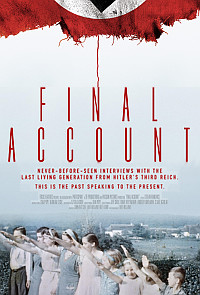 dir Luke Holland prd John Battsek, Luke Holland, Riete Oord with Karl Hollander, Otto Duscheleit, Hans Werk, Marianne Chantelau, Klaus Kleinau, Karl-Heinz Lipok, Hugo Gote, Heinrich Schulze, Heinz Hennig, Kurt Sametreiter, Margarete Schwarz, Franz Spalek release US 21.May.21, UK 3.Dec.21 20/UK Focus 1h34 VENICE FILM FEST Now streaming... |
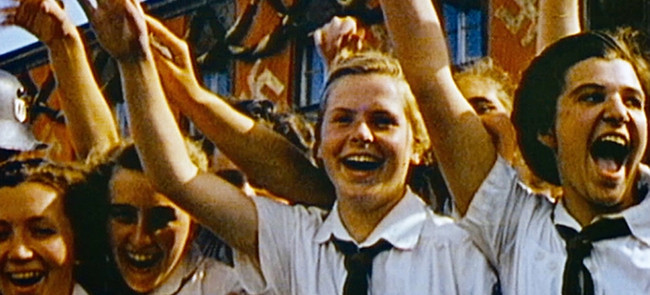 Over 12 years, late filmmaker Luke Holland collected first-hand interviews with Germans about atrocities committed during World War II. Most were children at the time, raised to never question their parents. Shot and edited with a hushed stoicism, the documentary strikes an appropriately sobering tone as people describe horrors they witnessed. What emerges is a remarkably complex look at people trying to remain distant from harsh truths about themselves. Now in their twilight years, these people recall their youth in a nation in thrall to charismatic new leader Hitler and his racist rhetoric, which appealed to the masses as a way to, yes, make Germany great again. As youngsters, they found themselves in the Hitler Youth, enjoying the activities, songs and uniforms without really understanding what it meant. Then as the genocide unfolded, they knew what they were seeing. And they now know that not speaking out sooner has left a mark on them. But will they address or reject their shared guilt? Holland edits the interviews with historical footage, including home movies of enthusiastic young people. But much darker layers emerge as these people describe seeing deep bigotry about the Jewish people. Descriptions of violence in the streets and camps is often harrowing, especially as seen through the eyes of a teen. Many recall sounds and smells with detail. And the final section, discussing the question of justice, has a strong kick. It's telling that most interviewees deflect prejudicial attitudes to siblings and parents. For example, one speaks about how his brother realised he needed to rethink he discovered his father was Jewish. Today they see their experiences through new eyes, and are horrified of what they observed and how Nazi songs are still imprinted in their memories. Karl-Heinz recalls being proud when, as a preteen, his parents bought him a Nazi uniform at a Jewish shop. Some are still in deep denial about what happened. While these recollections have been documented before, the angle here a new. The people who are interviewed speak with a haunted sensibility that's deeply unsettling. They acknowledge that everyone knew exactly what the Nazis were up to, remaining quiet out of fear. It's chilling to hear them acknowledge to their inaction in the face of such violence, while carefully avoiding an admission of complicity. But their shame is vivid, and adds complexity to what we think we know about history. It also makes us reconsider what we would have done in their shoes.
| ||||
|
Writing with Fire Review by Rich Cline | 
| |||||
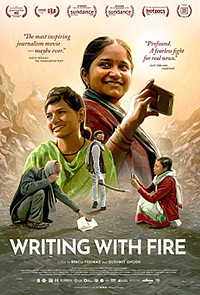 dir-prd Sushmit Ghosh, Rintu Thomas with Meera Devi, Shyamkali Devi, Suneeta Prajapati, Kavita Devi, Alima Tarannum, Krishna Mishra, Nazni Rizvi, Shivbaran, Satyam release US 26.Nov.21, UK 5.Jan.21 21/India 1h34 SUNDANCE FILM FEST  Now streaming... |
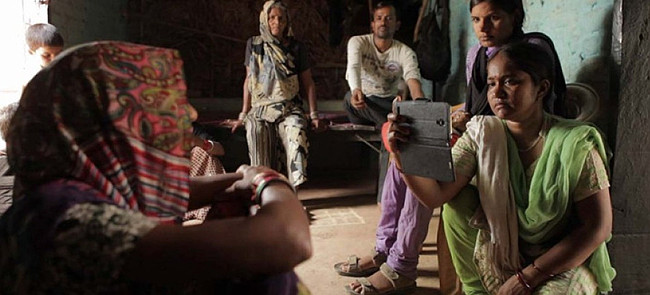 Crisply shot with a powerfully engaging cast of real people, this documentary centres on women who are positively changing their community in India simply by reporting the truth. Confronting rampant bigotry that springs from both endemic sexism and a harsh caste system, their impact on society is dramatic. The filmmakers capture scenes with earthy honesty and a vivid sense of these strong women who refuse to give up. The cameras follow tenacious female journalists reporting for the newspaper Khabar Lahariya (Waves of News). Launched by Dalit women in 2002, everyone thought it would fail, but it has instead upended a system that has long thrived on the oppression and violent abuse of women. "Journalism is the essence of democracy," says chief reporter Meera, noting that it's the only thing that can help average people confront injustice. And now her team is creating coverage for their popular YouTube channel, redefining the nature of success in a nation where journalists have always been upper-caste men. The film opens as Meera investigates a case of a woman who is being repeatedly raped, but pleas for help from both her and her husband elicit nothing but silence from the police. Elsewhere in the northern state of Uttar Pradesh, these journalists are advocating for people who are lied to by the government or threatened by corporate thugs who control the police. The filmmakers document several specific cases that have far-reaching ramifications, especially as political campaigns put them at odds with those in power. With their new digital outlet, Khabar Lahariya's reach becomes national, and they are now sharing their skills with a new generation, training up an army of young female reporters who would otherwise be sidelined due to their gender and caste. Educated and independent, they are rebelling against a system that removes all of their decision-making power. And of course the men don't like this. Even Meera's likeable husband Shivbaran refuses to admit that she has more power than he does. Structured with a gentle but driving pace, the documentary inventively finds ways to explore the elements of good journalism, cleverly contrasting mainstream news footage and government dissemblance with Khabar Lahariya's expert coverage. It's inspiring to see the determination of these women to remain neutral and fair in the face of rampant prejudice and pressure from all sides. And since journalists who dare to criticise the right-wing government are being murdered, they understand the urgency of speaking the truth. And so does their vast, growing audience.
| ||||

See also: SHADOWS FILM FESTIVAL © 2022 by Rich Cline, Shadows
on the Wall
HOME | REVIEWS | NEWS | FESTIVAL | AWARDS
| Q&A | ABOUT | TALKBACK | | ||||

